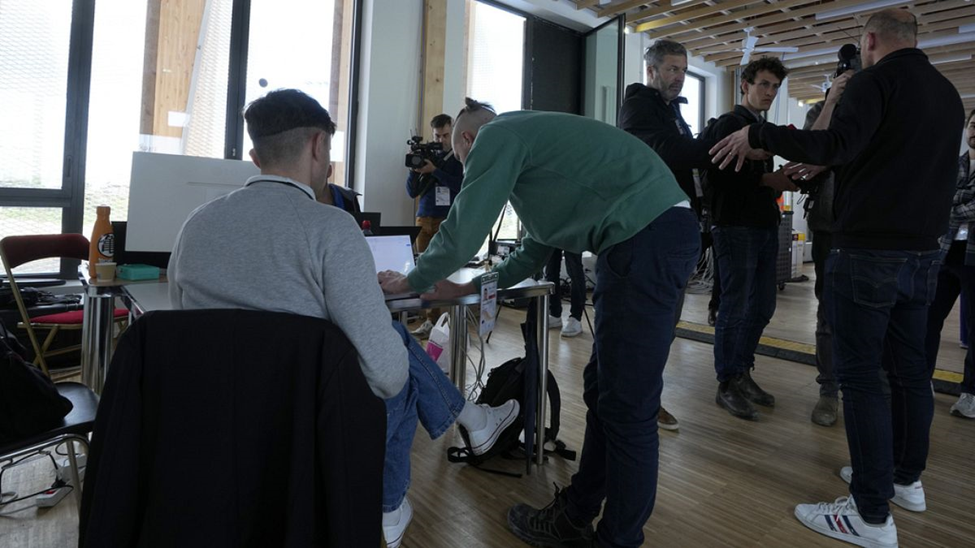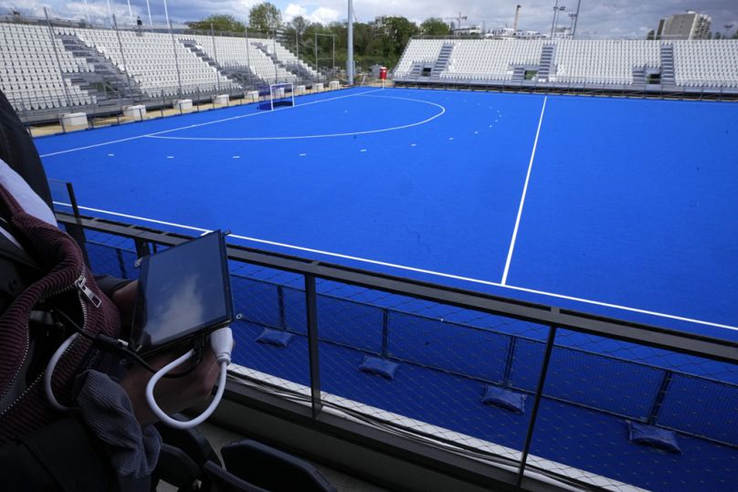A lesson plan for the busy ESL/EFL teacher incorporating plenty of reading, speaking and vocabulary practice. Level: B1 and higher – feel free to adapt to your circumstances and needs.
Source: Euronews with AP
France is expecting an uptick in cyber attacks during the sporting contest, particularly from Russia.
Cyber security defenders are preparing for the upcoming Paris Olympic Games.
The so-called cyberwarriors have studied and analysed potential hackers’ strengths, tactics and weaknesses.
Threats could be anyone from teenage show-offs and ransomware gangs to Russian military hackers with a track record of malicious cyberattacks that threaten to paralyse the IT systems vital for the sporting contest.
The job of spotting, analysing and responding to cyber threats is so sensitive and critical to the Games’ success that event organisers keep the hub’s location secret.
While those in charge of fending off cyberattacks during the contest won’t divulge much detail about their work, they have no doubt malicious hackers will keep them busy this summer.
A cyber-security experts hold a tablet at the Yves du Manoir stadium, Friday, May 3, 2024 in Colombes, outside Paris.Michel Euler/Copyright 2024 The AP. All rights reserved.
Targets are not limited to the Games themselves but also essential infrastructure essential, such as transport networks or supply chains.
It can be difficult to distinguish a hacktivist from a state-sponsored cyber operator posing as one.
Among the most threatening cyber-adversaries are countries who might want to embarrass and exact costs on France and the International Olympic Committee with proven offensive hacking chops. Russia is cited as a cause for concern.
Amid Russia’s ongoing war in Ukraine, Olympic organisers have barred it from competing in team events at the Paris Games. They will only allow some individual Russians to compete as neutrals.
Some cyber attacks will be ‘serious’
Vincent Strubel, who heads France’s national cybersecurity agency (ANSSI), called the cyberthreat level facing the Olympics unprecedented.
“There will be cyberattacks during the Games and the Paralympics,” he said at a briefing Friday. “Some won’t be serious. Some will be serious but won’t have an impact on the Games. And perhaps there will be some that are serious and liable to have an impact on the Games.”
Strubel said ANSSI has trained “enormously” and more than ever before.
“I think we have managed to stay a step ahead of the attackers,” he said.
While Strubel said Russia was cyber attacking France “recurrently,” he added it makes no sense to focus on one actor in particular. “We are preparing for everything.”
An especially aggressive unit of Russia’s GRU military intelligence agency dubbed Sandworm is blamed by Western nations for using malware dubbed “Olympic Destroyer” to disrupt the opening ceremony of the 2018 Winter Games in Pyeongchang, South Korea.
It’s the same unit accused of so-called wiper attacks on Ukraine’s power grid and the 2017 NotPetya virus that caused over €9 billion in damage worldwide.
Paris’ cybersecurity teams have sought to learn from those experiences, consulting technicians who also worked in Pyeongchang.
B1 and higher Levels – Reading and Vocabulary Lesson Plan
1. Warm-Up (10 minutes)
Discussion:
– What do you know about cybersecurity?
– Have you heard of any major cyberattacks in recent years?
– How important do you think cybersecurity is for major international events like the Olympics?
2. Reading Activity (20 minutes)
1. Why is the job of spotting, analyzing, and responding to cyber threats considered sensitive and critical to the success of the Paris Olympic Games?
2. What measures have event organizers taken to protect the cybersecurity hub, and why?
3. List some potential sources of cyber threats mentioned in the article.
4. Why is distinguishing a hacktivist from a state-sponsored cyber operator challenging, according to the article?
5. Explain why Russia is considered a significant cyber-adversary for the Paris Olympics.
6. How has Russia’s involvement in the war in Ukraine influenced the decision of the Olympic organizers regarding Russian athletes’ participation?
7. According to Vincent Strubel, what levels of severity can cyberattacks during the Games have? Provide examples.
8. What does Vincent Strubel mean when he says ANSSI has trained “enormously” and more than ever before?
9. Why does Strubel suggest it makes no sense to focus on one actor in particular? What approach are they taking instead?
10. Describe the role of the Russian GRU military intelligence agency’s Sandworm unit in past cyberattacks.
11. What specific past events have Paris’ cybersecurity teams studied to improve their defenses?
12. How have Paris’ cybersecurity teams used their consultations with technicians from Pyeongchang to prepare for the Paris Games?
3. Vocabulary Building (20 minutes)
Vocabulary List: Find these words in the text. In Context can you guess their meaning?
- Cyberwarriors:
- Ransomware gangs:
- Hacktivist:
- State-sponsored:
- Offensive hacking chops:
- 8. Malware:
- 9. Wiper attacks:
- 10. Recurrently:
4. Discussion and Analysis
- Do you think it’s possible to prevent all cyberattacks during an event as large as the Olympics? Why or why not?
- How do geopolitical conflicts, like the war in Ukraine, influence cyber threats at international events?
- What measures would you suggest to further improve cybersecurity for the Olympics.
Hope you enjoy this lesson plan. Thanks for your feedback and kind comments.
Cheers,
Mo
Answer Key:
1. Sensitive and Critical Job:
– The job is sensitive and critical because successful cyber attacks could paralyze IT systems vital for the Games, affecting not just the event itself but also essential infrastructure like transport networks and supply chains.
2. Protective Measures for Cybersecurity Hub:
– Event organizers have kept the location of the cybersecurity hub secret to prevent potential attackers from targeting it.
3. Potential Sources of Cyber Threats:
– Potential sources include teenage hackers, ransomware gangs, and state-sponsored hackers, particularly from Russia.
4. Challenge in Distinguishing Hacktivists from State-Sponsored Operators:
– It’s difficult because state-sponsored operators might pose as hacktivists, making it hard to identify their true origin and motives.
5. Russia as a Significant Cyber-Adversary:
– Russia is considered significant due to its track record of cyberattacks and its potential motive to embarrass and impose costs on France and the International Olympic Committee amid the ongoing war in Ukraine.
6. Influence of War in Ukraine on Russian Participation:
– Because of the war, Olympic organizers have barred Russia from competing in team events and only allow some individual Russians to compete as neutrals to mitigate any potential political implications.
7. Levels of Severity of Cyberattacks:
– Cyberattacks can range from minor disruptions to serious attacks that might impact the Games. For instance, some might not affect the Games at all, while others could have significant consequences.
8. Extensive Training by ANSSI:
– Strubel means that ANSSI has put in extensive effort and preparation, more than ever before, to ensure they can effectively counter potential cyber threats.
9. Approach to Cyber Threats:
– Strubel suggests it’s ineffective to focus on a single actor because threats can come from multiple sources. Instead, they are preparing for a wide range of potential threats.
10. Sandworm Unit’s Role in Past Attacks:
– The Sandworm unit is blamed for the “Olympic Destroyer” malware used to disrupt the 2018 Winter Games and for wiper attacks on Ukraine’s power grid and the NotPetya virus in 2017.
11. Studied Past Events:
– Paris’ cybersecurity teams have studied past incidents like the 2018 Winter Olympics cyberattack to improve their preparedness and defenses.
12. Consultations with Pyeongchang Technicians:
– They have consulted with technicians from the Pyeongchang Games to learn from their experiences and apply those lessons to better secure the Paris Olympics.
Questions:
1. Why is the location of the cybersecurity hub kept secret?
2. What range of threats are the cyberwarriors preparing for?
3. Why is Russia considered a significant threat to the Paris Olympics?
4. What specific incidents from the past have Paris’ cybersecurity teams learned from?
5. According to Vincent Strubel, what levels of seriousness do cyberattacks during the Games range from?
Activity:
– Have students write down their answers individually.
– Discuss the answers as a class to ensure comprehension and clarify any misunderstandings.
Activity:
– Divide students into small groups and assign each group one prompt.
– Have each group discuss their prompt and then share their conclusions with the class.
6. Homework Assignment
Task:
– Write a short essay (200-300 words) on the importance of cybersecurity in modern international events. Use at least five of the vocabulary words learned in the lesson.
Evaluation:
– Collect the essays in the next class.
– Assess students on their use of vocabulary, comprehension of the topic, and ability to articulate their thoughts clearly.
—
Student Handout
Cyberwarriors Prepare Against Attacks During Paris Olympics
Article Summary:
Cybersecurity experts are on high alert as they prepare for potential cyberattacks during the upcoming Paris Olympic Games. The location of their operations remains secret due to the sensitivity of their work. These experts anticipate a variety of threats, from teenage hackers to state-sponsored cyber operatives, particularly from Russia. Historical cyber incidents, such as the 2018 Winter Olympics attack, have informed their preparations. Despite the challenges, the cybersecurity team remains confident in their ability to protect the Games.
Vocabulary
Cyberwarriors: Expert cybersecurity personnel who protect against cyberattacks.
Ransomware gangs: Criminal groups that use malicious software to block access to data until a ransom is paid.
Paralyse: To bring to a halt or disable.
Hacktivist: A hacker who uses their skills to promote political ends.
State-sponsored: Supported or carried out by a government.
Offensive hacking chops: Skills and capabilities in conducting aggressive cyberattacks.
Unprecedented: Never done or known before.
Malware: Software designed to disrupt, damage, or gain unauthorized access to a computer system.
Wiper attacks: Cyberattacks that aim to delete data permanently.
Recurrently: Happening repeatedly or frequently.




